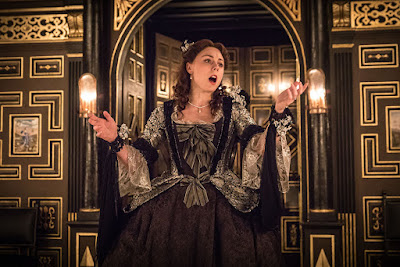 |
| David Horovitch & ensemble - Nick Drake: All the Angels Sam Wanamaker Playhouse, photo Marc Brenner |
Reviewed by Robert Hugill on Dec 16 2016
Star rating:
The creation of Handel's Messiah is the centrepiece for this delightful music-led drama
Nick Drake's play All the angels takes a number of curious facts about the first performance of Handel's Messiah in Dublin in 1741, and weaves them into a delightful fantasy which mixes drama with the music of Messiah in a striking way. We caught the performance on Friday 16 December 2017 at the Sam Wanamaker Playhouse at the Globe Theatre, directed by Jonathan Munby and designed by Mike Britton, with David Horovitch as Handel, Kelly Price as Susannah Cibber plus Sean Campion, Lucy Peacock, Saskia Strallen, Lawrence Smith, and Paul Kemble.
The play incorporates Messiah, with the singers being provided by Lucy Peacock, Saskia Strallen, Lawrence Smith, and Paul Kemble plus four singers from a pool of eight supplied by alumni of Genesis Sixteen (Tom Castle, Nancy Cole, Camilla Harris, Rebekah Jones, Angus McPhee, Ben Vonberg-Clark, Daisy Walford, Jamie Wright), with instrumentalists Jorge Jimenez and Naomi Burrell (violins), Joanna Levine (cello), Adrian Woodward (trumpet), and Mchael Haslam (harpsichord and musical director).
The play takes a group of known facts, that Handel down on his luck with opera in London travelled to Dublin to give a season there; that he got stranded in Chester and tried out passages from Messiah with a choir there, getting annoyed with a bass who could not read the part correctly; also in Chester he met the young Charles Burney; once in Dublin he cast the actress Susannah Cibber in the mezzo-soprano solos even though she was an actress and was away from London because of a sexual scandal involving her husband and her lover (the nastiness was mainly on the part of her husband); the porter at the music hall in Fishamble Street where Handel's music was performed was known as Crazy Crow and he was also a resurrectionist (stealing dead bodies for dissection).
 |
| Kelly Price as Mrs Cibber - photo Marc Brenner |
Sean Campion acted as narrator as Crazy Crow, weaving his invented story into the facts, and totally charming us. Campion also doubled as as surprisingly fey Charles Jennens, and William Cavendish who invited Handel to Dublin.
What made the performance was that the chorus of eight were fully involved in the action, with the four members of the regular cast, Lucy Peacock (who also played the soprano soloist in the Dublin Messiah, Signora Avolio), Saskia Strallen, Lawrence Smith, Paul Kemble, indistinguishable from the four 'regular' singers and the music not only formed the entractes, but acted as the sound track to both Handel and Crazy Crow's thoughts. Crazy Crow finds the music moving and disturbing, and the singers are threatening, whilst at one point Handel is working on the music and we hear the singers (stood round him) performing it, changing it, only for them to evaporate when Susannah Cibber arrives.
There were some delightful moments early on in the play, with the rehearsal in Chester and with first encounter of the Dublin choir with the music, when the singers had to sing badly and behave unprofessionally.
This was an enchanting fantasy about the creation of an enduring masterpiece, capitalising on the fact that a number of curious facts accumulated around the event. What made it, was the way that rather than down-playing the music, this became an integral part of the drama.
Elsewhere on this blog:
- The craft of writing music: Rachel Portman on writing for films, the M&S 2016 Christmas advert, and opera - interview
- Thought-provoking: Mozart's Don Giovanni from Teodor Currentzis & Musica Aeterna on Sony - CD review
- Contemporary mix: A Land so Luminous - CD review
- Vibrant music making: Arcangelo in Bach and Telemann - Concert review
- A new case for NormaBaritone Ricardo Panela considers the effect of the 1950s bel canto revival on how we listen to Bellini's opera - feature article
- Christmas with the choir of St John's College: Choral at Cadogan - concert review
- Telling stories: Sir John Tomlinson in Schubert's Swansong at the Wigmore Hall - Concert review
- Magic and mystery: Society of Strange and Ancient Instruments at Spitalfields - concert review
- Rising to the challenge: W11 Opera perform Russell Hepplewhite and Helen Eastman's The Price - opera review
- Writing in her own style: I chat to harpist, clarsach player and composer Ailie Roberson - interview
- Circular music: Catches, rounds and ground bass from Pellingman's Saraband - CD review
- Dark story: Violinist Linus Roth in Shostakovich and Tchaikovsky - CD review


%20in%20The%20Merry%20Widow.%20Credit%20Mihaela%20Bodlovic.%20(2).jpg)

%20in%20Trial%20by%20Jury.%20Credit%20Mihaela%20Bodlovic..jpg)

.jpg)
%20Britten%20Pears%20Arts%20(1).jpg)



No comments:
Post a Comment